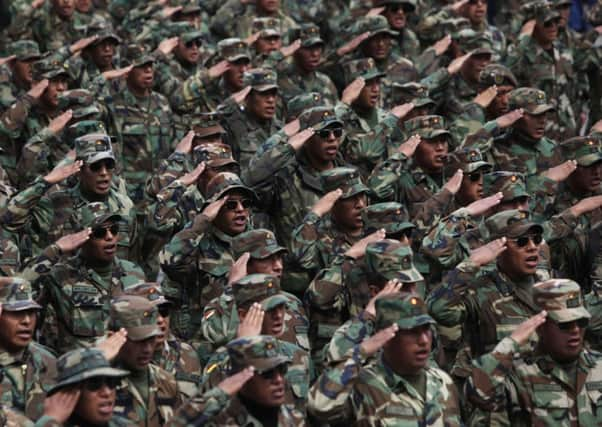Bolivian military sacks 700 troops over dispute


The army, navy and air force said in a statement that they had ordered the dismissal of the 702 soldiers because they “committed acts of sedition, rebellion, conducted political actions and attacked the honour of the armed forces”.
The unprecedented military protest began on Tuesday with 500 soldiers, but expanded to about 1,000 on Thursday.
Advertisement
Hide AdAdvertisement
Hide AdNon-commissioned officers and sergeants marched through the capital, La Paz, in camouflage uniforms, together with some of their wives and Aymara indigenous leaders who supported their demands.
Protesters claim the military discriminates against indigenous Bolivians.
The protesters are demanding changes so that NCOs in Bolivia’s military can study to become career officers.
They are also demanding the release of four protest leaders who were fired on Monday and say they want more medical benefits on a par with officers.
“It cannot be that they dismiss our brothers for demanding their rights. We will expand the protest if they are not reinstated,” said indigenous leader Samuel Coarite. On Wednesday, defence minister Ruben Saavedra said the situation in Bolivia’s armed forces was changing and that in 2015 enlisted men and sergeants would be able to receive scholarships to study, in the same way officers do.
The unrest is all the more significant as president Evo Morales is the first indigenous Bolivian, an Aymara Indian, to lead the country.
A controversial figure who has sought to transform Bolivia’s free-market economy to a socialist model of state ownership, the former coca grower was elected in 2006 on a promise to govern in favour of Bolivia’s indigenous majority, who had suffered centuries of marginalisation and discrimination. Coca is a traditional Aymara crop.
Mr Morales, 54, espouses a form of politics that combines left-wing ideology with an emphasis on traditional Andean values and social organisation.
Advertisement
Hide AdAdvertisement
Hide AdHis political base is among the indigenous population of Bolivia’s western highlands, while opposition has been concentrated in the wealthy eastern lowland province of Santa Cruz, Bolivia’s economic powerhouse.
His left-wing policies have worried and antagonised many middle-class Bolivians who believe he is too radical. He rattled investors a few months after taking office by placing the country’s rich gas fields under state control.
He was re-elected president with 64 per cent of the vote – easily defeating his conservative opponent – and gained ground even in Santa Cruz, in a sign the nation was in favour of his economic changes.
Since then he has nationalised energy-generating firms and reformed pensions, taking over private funds and extending the state pension to millions of poor Bolivians.
His politics and style are in stark contrast to former president Gonzalo Sanchez de Lozada, who pursued an American-style free-market economic model and was forced to resign in 2003 following violent protests.
Opponents accuse Mr Morales of having ties to drug trafficking because of his defence of the coca industry, but he and his supporters stress the coca leaf is an intrinsic part of indigenous Andean culture, and not just the raw material for cocaine, demand for which comes from North America.
The indigenous protesters have asked to meet Mr Morales, but he has not spoken publicly about the demonstrations.